10 Most Popular Apple Types—and Which Ones Are Best for Baking and Snacking
These are the most widely available apple varieties.
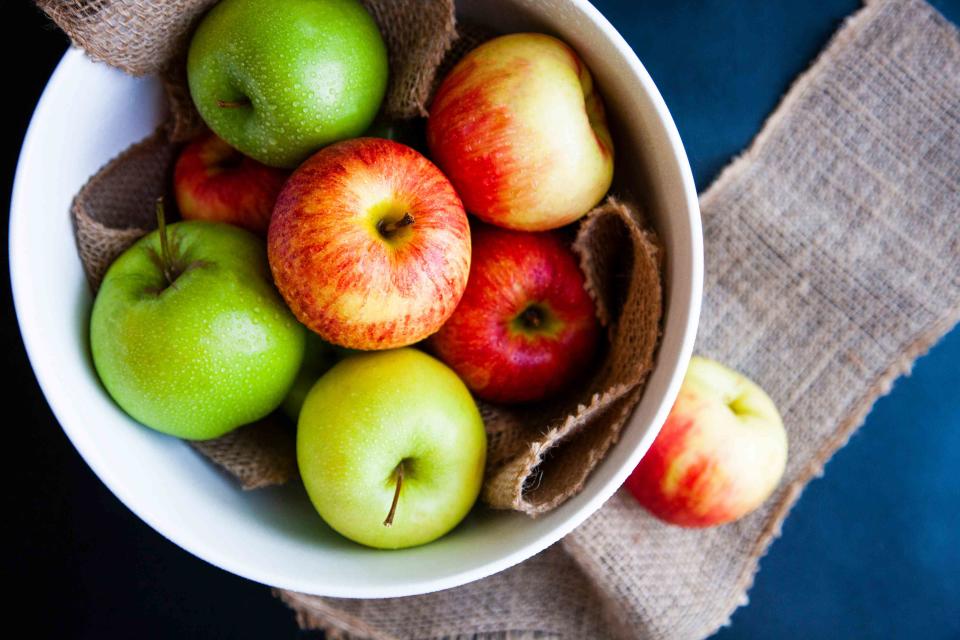
Emily Wiggins / GETTY IMAGES
Walk into your local grocery store, and you'll find stacks and stacks of apples with colors ranging from speckled golden yellow to deep ruby red. Their textures and flavors are as varied as their colors. Some are sweet, some are tart; a few (like Honeycrisp) strike a happy medium. Some types of apples are best suited for baking, while others are ideal for biting into straight from the crisper.
Just like their flavor, the texture of apples varies by variety as well. Some are crisp and snappy when bitten into, and others are softer. The balance between flavor and texture will determine which apple varieties you use for which purpose. Softer apples will break down more quickly, while those crisp, juicy varieties hold up better when cooked. Whether you're baking a mile-high apple pie, making a pot of homemade applesauce, or adding slices of fresh apple to a crisp autumn salad, there’s an apple variety for you. Here are the most popular types and how to use them.
Related: Should You Refrigerate Apples to Keep Them Fresh? Here's What the Experts Say
Granny Smith
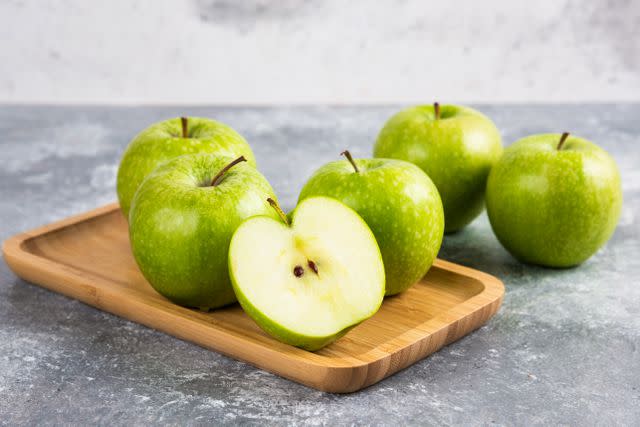
undefined undefined / GETTY IMAGES
Originally cultivated in Australia in the mid-1800s, Granny Smith apples are now one of the most widely available apple varieties out there. They're also one of the most versatile. Their mild tartness is just enough to leave your cheeks puckered when you take a bite. Their texture is firm and crisp, so they hold up well when baked and won't turn to mush (or cause a pie crust to get soggy).
How to Use: Granny Smiths are an obvious pick for apple pies, tarts, and coffee cakes. They also maintain some of their structure when fried, making them a go-to choice for glazed apple fritters. When combined with a sweeter apple variety, they provide a unique tartness in apple butter. And they’re the classic choice for everyone’s holiday favorite—caramel apples.
Golden Delicious
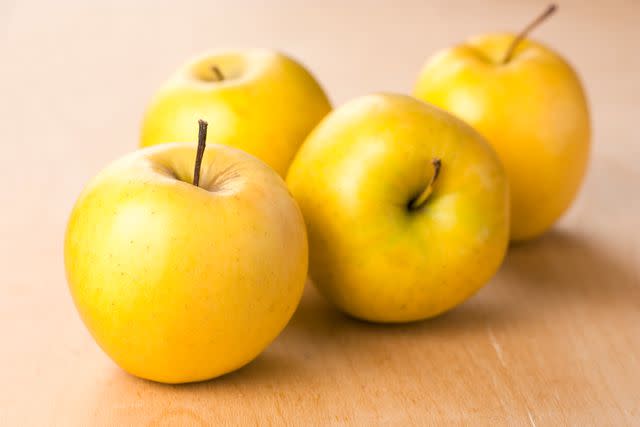
liaminou / GETTY IMAGES
These apples originated on a small farm in West Virginia in the early 1900s. A trademark golden-hued skin makes them stand out from the crowd. Their smooth white flesh is sweet and mellow in flavor and has a fairly soft texture.
How to Use: We love to eat Golden Delicious apples fresh, slice them up for salads, add them as a garnish on charcuterie boards, and skewer them to dip into cheese fondue.
Red Delicious
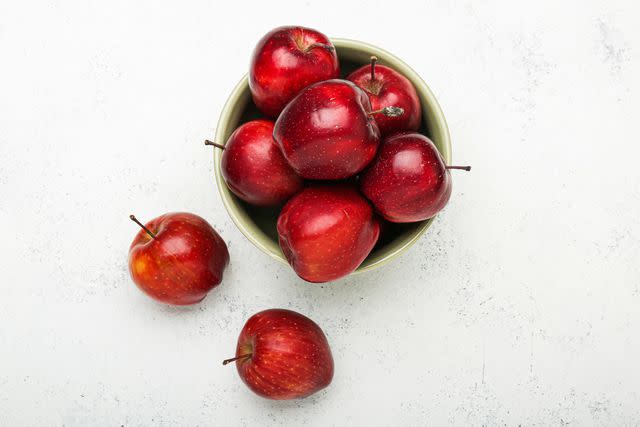
LiveFree / GETTY IMAGES
An older cousin to their golden counterparts, Red Delicious apples were discovered in Iowa in the 1870s. They have that signature red color and distinct apple flavor that we associate with the fruit. If you’ve ever had an apple-flavored candy, it was most likely modeled after the flavor of a Red Delicious.
How to Use: They are quite watery and, as such, don’t hold up well to baking, but their neutral, slightly sweet flavor makes them great for eating out of hand.
McIntosh
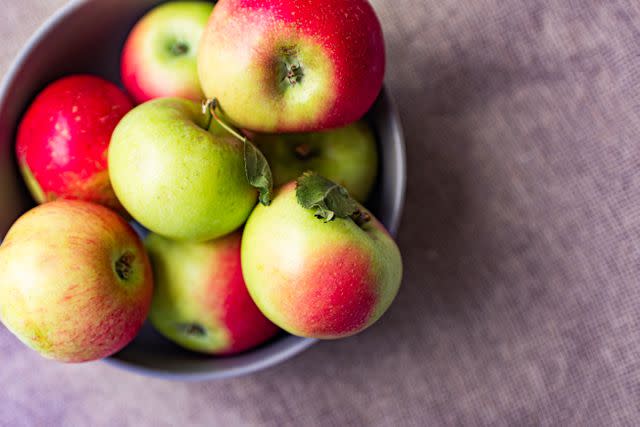
Victoria Colin / GETTY IMAGES
You probably think of the technology company before you think of the apple that is one of the most common across North America. The McIntosh apple variety originated in Canada in the early 1800s. It is regarded as a dessert apple because of its sugary, sweet flavor. We think they have a nice balance of acidity as well.
How to Use: The fruit is pretty soft, so it's not ideal for pies and tarts, but it does wonders in applesauce. Martha reaches for this variety to make her pink applesauce, which can be used for this rose-hued tart or in other desserts like applesauce cake.
Honeycrisp
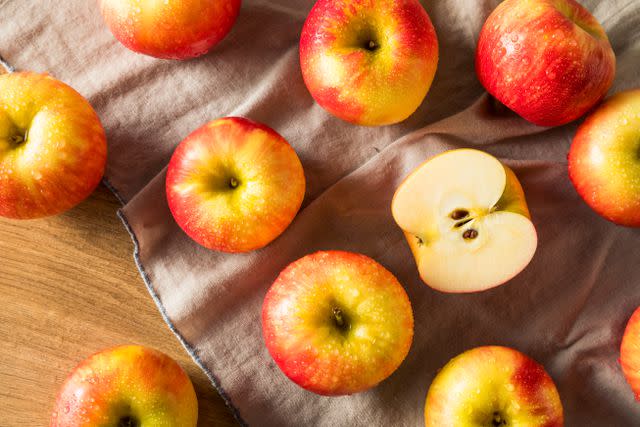
bhofack2 / GETTY IMAGES
Honeycrisp apples have gained a tremendous amount of popularity in the last decade or so. They originated as part of the apple breeding program at the University of Minnesota. The Honeycrisp is a cross between the Midwest-native Macoun and the Honeygold apple. It's often referred to as an "all-purpose" apple since it’s delicious both in baking applications and when eaten fresh.
How to Use: Honeycrisps are a great apple to add to the mix for coffee cake, baked apples, and pie, especially our caramel apple pie, which brings out all of the Honeycrisp's natural sugars. Their flavor is so well-balanced that they work exceedingly well in savory recipes too. They're not overly sweet but not too tart, which makes them perfect to pair with meaty pork chops.
Tips
Another University of Minnesota hybrid, the SweeTango apple, is a mix of the Honeycrisp and Zestar varieties. It's newer to the market and has a condensed sweet flavor and shatteringly crisp bite.
Gala
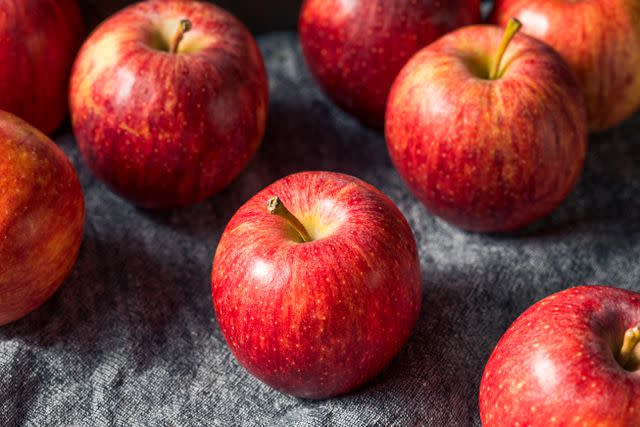
bhofack2 / GETTY IMAGES
Gala apples are a 1930s hybrid from New Zealand, and they're one of our favorites to snack on. The Gala is not very well suited to baking; while it's one of the sweetest of the bunch, it is often too sweet for desserts.
How to Use: Core a Gala apple, slice it into wedges, and enjoy it with a smear of nut butter or a simple sprinkle of flaky sea salt.
Pink Lady
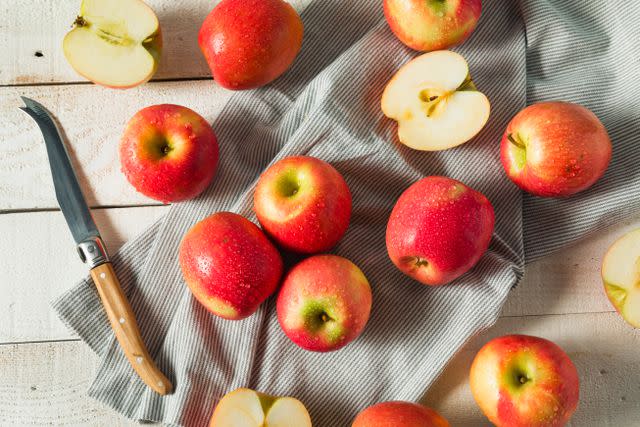
bhofack2 / GETTY IMAGES
Like many other apples, the Pink Lady is a hybrid. It's a cross between the Golden Delicious and the Lady Williams and was cultivated by a horticulturist in Australia in the 1970s. Flavor-wise, Pink Ladies are mostly sweet and a little tangy.
How to Use: They make a good addition to any apple pie filling and add great flavor to savory soup like butternut squash soup.
Fuji

MEDITERRANEAN / GETTY IMAGES
Fuji apples are a Red Delicious hybrid founded in Fujisaki, Japan—hence their name. They tend to be on the sweeter side and have a refreshingly crisp finish. Their firm flesh takes a long time to break down, so they’re not well suited for pie.
How to Use: Eat Fuiji apples as a snack or slice them up and add them to a fresh fruit salad with other seasonal ingredients, like grapes and citrus.
Empire
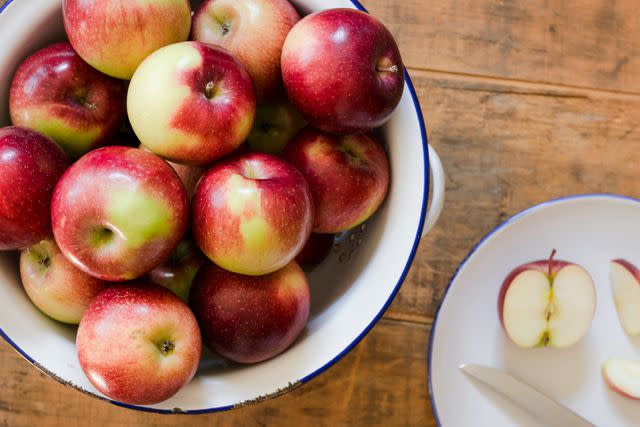
Brycia James / GETTY IMAGES
Empire is a hearty apple variety named after the state they were created in. They were developed at Cornell University in Ithaca, NY, in the 1940s. When raw, Empire apples are crisp and crunchy. When cooked, even more of their sweet flavor comes out.
How to Use: If using them in pie filling, make sure to pair them with other apple varieties that have firmer textures, like Granny Smiths. We love to use Empire apples to make apple chips, which are perfect for snacking or decorating the tops of cakes.
Jazz
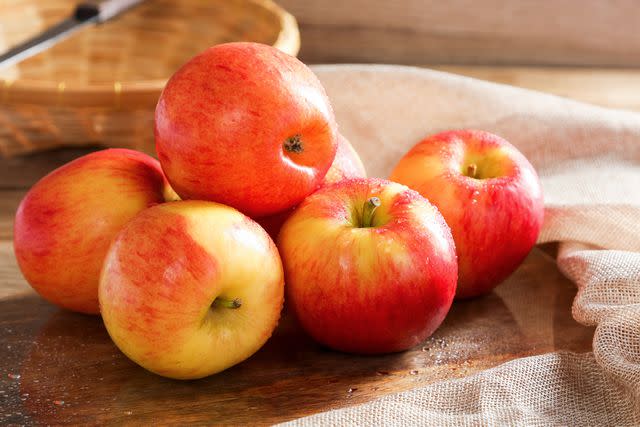
BirdShutterB / GETTY IMAGES
Jazz apples are grown all around the world, but they originated in New Zealand. This type of apple is crisp and crunchy, with a flavor very similar to pears.
How to Use: One of our favorite ways to use Jazz apples is in cobblers and crumbles, but they hold up well in stuffing for savory recipes as well.
Read the original article on Martha Stewart.

